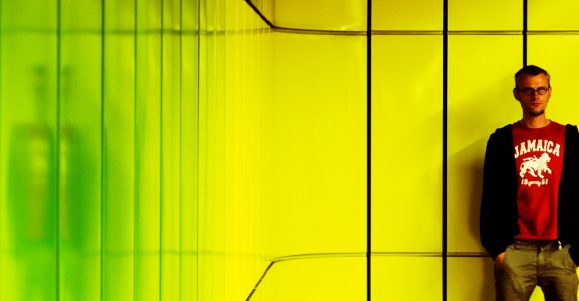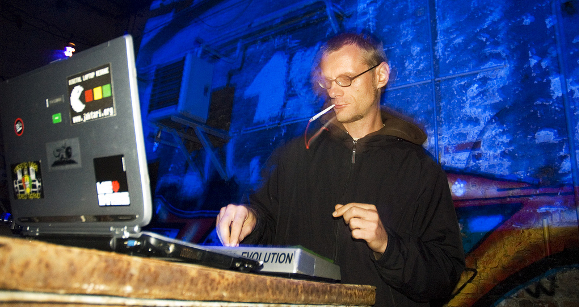Articles about reggae music, reviews, interviews, reports and more...
Interview: Jahtari
- Home
- Articles
- Interviews
- Interview: Jahtari

Interview: Jahtari
"We try to use different sound aesthetics than the classics, something that doesn't come from the reggae tradition, and see what happens"
Sampler

Jahtari explores the technology frontline with old-school equipment
German label Jahtari and its founders Disrupt and Rootah have taken the 80’s digital reggae craze to a new level. They’re not only inspired by reggae from that era, but also by classic video and computer games made for sets such as Nintendo and Atari. United Reggae got a chat with Disrupt about his influences, the importance of technology and his all-time favorite video game.
I grew up in the 80’s. There was no Internet and no commercial TV or radio. Vinyl still reigned and CD was just about to get introduced.
Kids played with physical toys and games. No iPads, no Teletubbies. But in the latter part of the 80’s things started to change for my friends and me. We were introduced to Commodore 64 – THE computer at the time – and Nintendo. From then on, nothing was ever the same. I spent countless hours playing games on the computer and later on the Nintendo console that my parents got me and my brother.
When I talk to Disrupt – one half of the Jahtari label – it almost feels like we share a common childhood interest in computers and video games. He and his partner Rootah use their computer experience when they produce music today.
A different approach
Together they started the Jahtari label in 2004. Initially releasing everything as free MP3’s, but since 2008 they also release vinyl. They’re essentially making reggae and dub, usually with ultra-heavy bass lines.
“We try to use different sound aesthetics than the classics, something that doesn't come from the reggae tradition, and see what happens. Like 8 bit sounds,” says Disrupt.
Neither Disrupt nor Rootah come from a reggae background, and they both discovered reggae relatively late.
“We originally come from Detroit techno, the Warp releases and generally more electronic music when it was a bit more underground. We were also big fans of the Basic Channel records, and since we went to their Hardwax store in Berlin a lot we discovered their Rhythm & Sound stuff, which was the first time we really heard something like an offbeat,” explains Disrupt, and adds:
“When they later started to re-press a lot of Wackies records we were totally hooked to dub and reggae. Lee Perry, King Tubby, King Jammy, Bunny Lee, etc.”
Disrupt gives several reasons as to why he loves dub.
“It’s seemingly slow, so there are many gaps to fill with whatever you want. Faster music doesn't have those gaps. I also love the hypnotic quality of it all. It very much works like techno: layering soundscapes on top of each other, free from any fixed song structure. It's a very free and universal music.”
A common ground
Techno and house music is often described as music forms derived from dub. Jamaican producers also pioneered remixing, or versioning as it is called in reggae.
“I think techno took a lot from dub, consciously or not. If you listen to Basic Channel records, and then to Rhythm & Sound – done by the same people – the similarities become apparent. It's the layering of soundscapes to form a song, the hypnotic repetition and minimal muting or adding of sounds that made us feel at home with dub immediately, although we had never heard it before. Techno is just using the same essential techniques,” he says.
Disrupt uses his previous musical experiences in his reggae and dub productions.
“I love synth strings, especially the Detroit guys like Carl Craig, Robert Hood and others were great with them. They are almost never used in reggae, so it's great to see them work perfectly in there. It's also good to approach dub coming from the loose forms of techno, away from the classic verse-chorus-structure. Thinking in varying loops rather than a fixed formula,” explains Disrupt.
Apart from all these reggae and techno producers Disrupt also mentions computer games as an important influence.
“Since we also played a lot of computer as kids in the late 80’s and early 90’s, we grew up with the brilliant game soundtracks from this era. Definitely a big influence as well.”
Digital laptop reggae revised
 The music coming from the Jahtari headquarter is not described as digital reggae. Instead they’re using a more significant description – digital laptop reggae.
The music coming from the Jahtari headquarter is not described as digital reggae. Instead they’re using a more significant description – digital laptop reggae.
"We came up with that term quite a long time ago. It just says that we do reggae with a computer, as we couldn't afford any other gear then, and make it sound like a computer too. You can do a lot of funny things to songs with a computer, things that the classic masters couldn't do in the 70’s, so it was time to explore this field more,” he explains.
However, they have now moved on. Today they instead try to do as little as possible with computers.
“Nowadays you spend too much time in front of computers anyway. Facebook, e-mail, Youtube, iPhones, apps, etc. It's just too much. It feels very freeing to use real machines, to get a break from it. Also machines will never have a driver or windows problem, you switch them on and they work. You feel just much more like a musician than a computer technician,” says Disrupt, and explains the shortcoming of a computer:
“It's a great machine, but it's missing one essential thing – you can't really touch all the knobs there,” he says, and explains further:
“That's why we’ve now started to use old school analogue synths, modular systems, drum machines, filters, Game Boys and also build our own synths from old Commodore or Soundblaster chips. The sounds from those haven't really been used in reggae. So let's see what comes out there. We should definitely come up with a new term for the sound, though. Voltage controlled dub or something.”
The codex
Disrupt and Rootah are seemingly structured and efficient. If you visit the label’s web site you’ll get a clear view of what the label is about – both in graphics and in words. They have also taken the time to explicitly explain what they do and what they’re looking for. All of this is summed up in a three point Theory.
“The Theory was first of all for ourselves – to write down what exactly it is you want to do with the label. The codex, so to speak. Since we're always looking for new artists we posted it on our site, to get in touch with other people who think the same. This way we got to know a lot of other musicians out there who are also up for exploring the boundaries of dub some more,” he explains.
Curiosity is key
In the Theory they write about the technology frontier and that it is essential to constantly keep researching on that frontier. But Rootah and Disrupt mainly use old school technology for creating music.
“We always try to do stuff to reggae that hasn't properly been done before. To achieve this it wouldn't make much sense to use the same technology that for instance Lee Perry used. He got all out of his gear that's possible, and it's no use to do that very same stuff over again. So we have to look for ways to dub things up in a way that wasn't an option back then,” he says, and exemplifies:
“Like computers. Or analogue synths and modular systems. That Kraftwerk-kind-of-gear is very old school, but was very expensive at the time, and thus a Moog synth was almost never used in reggae. Synths became big only in reggae when they went cheap, and that was the digital era of the mid-late 80’s. Luckily today you can build analogue gear quite cheap yourself.”

Explore the frontline
Being in the frontline of technology is essential to Disrupt. You need to explore the frontier and come up with new things. Disrupt gives another example:
"Like when dubstep came, that was unheard of. Nothing else makes sense, there's no point in repeating stuff that has been done to death already. Technology gives you the tools to expand this frontline, but not everything that's new is necessarily also better. Funnily enough old synths without any displays and preset patches can often give you more experimental sounds than new ones.”
Favorite video game
Thinking about how the music from the Jahtari imprint sounds, you definitely get the feel of old meets new. The bass lines are abyss deep, and some of the other ingredients make you think about classic video games like Super Mario Brothers. Even though this first version of Nintendo’s pioneering video game is probably my all-time favorite, Disrupt has other beloved choices for the top spot.
"It has to be the two first Monkey Island adventure games (all later ones don't count). Not only have they an amazing pirate story, a brilliant Simpsons-kind-of humor and a great atmosphere. They also got a brilliant reggae soundtrack by Michael Z. Land. Looking back, this was the first time I ever heard reggae from a computer. I'd always wanted to make proper heavy dub versions of those tunes.”
Read more about this topic
Comments actually desactivated due to too much spams
Browse by categories
Recommended Articles
Latest articles
Recently addedView all
© 2007-2026 United Reggae. All Rights Reserved. Reproduction in whole or in part is prohibited. Read about copyright
Terms of use | About us | Contact us | Authors | Newsletter | A-Z














